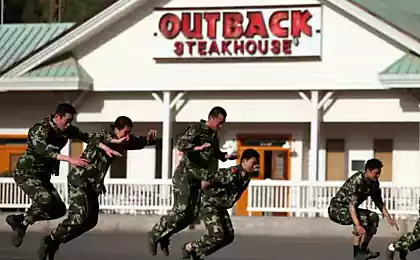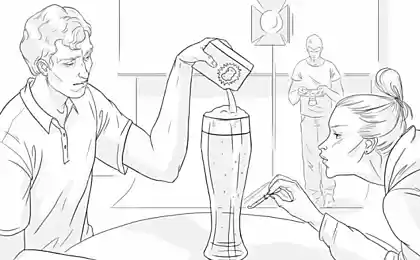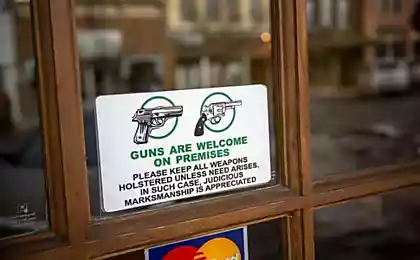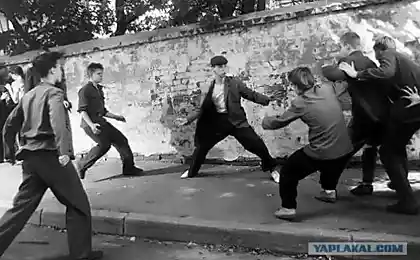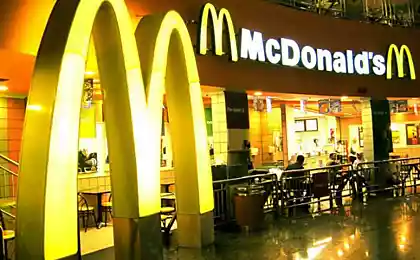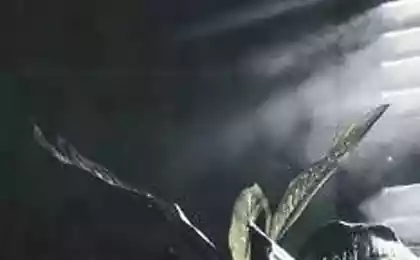469
Medics checked fast food
"I have many times warned Moscow residents about the dangers of all kinds of shawarma, donuts and other products sold on the streets in tents. And then the sellers go bankrupt and leave the market themselves. Now times have changed, and you can give up all these tents, "- concluded Filatov.
He also said that fast food is different. "There is a solid network cafes, where you can quickly, safely and inexpensive meal. However, the fast food offered in dubious tents on the streets is dangerous for the health of citizens, "- said sanvrach.
Recall that more than a year ago in Moscow issued a decree signed by the head of the Department of Consumer Market and Services Vladimir Malyshkovym and by Nikolai Filatov, which prohibits the sale of shawarma in small retail network, including due to violations of sanitary norms. However, the street dealers continue to trade shawarma fast food and other products of dubious quality, in spite of the documents.
Most recently, in late September, the capital city administration said it is determined to deal with fast food outlets. During a recent meeting of the Moscow government, it was decided to make a schedule for the reduction of non-stationary objects small retail trade in the streets. It is expected that this time the measures will be the most severe. But it is difficult to say what alternatives the city authorities are preparing to Muscovites.
The mayor ordered the prefects and the Department of Consumer Market and Services to optimize the process of reducing the number of stalls in the streets. "We need to reduce the number of objects small retail trade to zero. It is about the stalls and Tonara, "- said Yuri Luzhkov.
According to the mayor, other enterprises of the consumer market in Moscow is quite able to replace the street stalls. "We now have a system that replaces these figures that, as a rule, operate in tax-free regime", - he stressed. The mayor drew attention to the fact that many owners of stalls not only tax evasion, but also spread on the shelves substandard or expired goods.
The war with stalls on the streets for a long time being.
In autumn 2004, the Moscow government adopted a decree "On regulation of the use of the metro area and 25 m of the ground station hall and underground facilities." In accordance with the zone near the ground lobby of the station have been removed all the tents, including newspaper stalls and kiosks with ice cream.
This decision came after the terrorist attack at the metro station "Riga" in summer 2004. Then, because of the many tents, folding tables and benches retailers emergency vehicles - fire, ambulance - we were not able to drive quickly to the scene.
In June 2006, it carried out an entire campaign against shawarma. Then the Department of Consumer Market and Services of Moscow, together with the territorial department of Rospotrebnadzor metropolitan prefectures sent letters demanding to suspend the sale of fast food in summer cafe and car
Trade offered to change the profile of activity in the event of a point can simply close. Such measures are the government's response to numerous complaints of residents and guests of the capital to the poor quality of products, as well as frequent cases of poisoning. But tangible results the campaign has not brought.
Soon a wave spread to all pre-fabricated construction. According to the plan of the government of Moscow city was to get rid of them before the end of 2007. However, the mayor's office recognized that the displacement of stalls from city streets will take a long time. As long as the required documents are not developed. But the overall plan of action from the officials already have.
Head of the Department of Consumer Market and Services Vladimir Malyshkov said that existing programs to eliminate the tents. "We will leave only the kiosks selling newspapers, flowers, ice cream, as well as providing reference services", - he said, adding that, in his opinion, the term of the program is three years. But, according to First Deputy Mayor Vladimir Resin, it's too long, and it requires to meet before the end of 2007.
"The government's decision is generally directed to a good cause, - he told the newspaper VIEW chairman of the Confederation of Consumer Societies, Dmitry Yanin. - The face of the city for a long time needs to be updated: sometimes can not see any houses or streets. All closed tents and trade pavilions. " According to the expert, such measures may lead to positive results.
It's time to clean up the tent tobacco, if we want to reduce the number of cardiovascular disease and cancer, "- said Janine. But, according to Chairman of the Board, measures to reduce the number of outlets should be carried out very carefully.
"The outlets are concentrated near transportation hubs. Here they are really worth to eliminate. However, in residential areas should be clearly calculate whether residents within walking distance from shops where you can buy essentials.
It is no secret that there is shortage of outlets in the city center, and in certain areas. Everything else can be replaced, "- said the expert. In addition, Yanin advises the authorities to give time the owners of small retail trade odds. "We need to provide entrepreneurs with at least three months. They should be able to finish the business, employ workers and to find a new use for their business. "
He also said that fast food is different. "There is a solid network cafes, where you can quickly, safely and inexpensive meal. However, the fast food offered in dubious tents on the streets is dangerous for the health of citizens, "- said sanvrach.
Recall that more than a year ago in Moscow issued a decree signed by the head of the Department of Consumer Market and Services Vladimir Malyshkovym and by Nikolai Filatov, which prohibits the sale of shawarma in small retail network, including due to violations of sanitary norms. However, the street dealers continue to trade shawarma fast food and other products of dubious quality, in spite of the documents.
Most recently, in late September, the capital city administration said it is determined to deal with fast food outlets. During a recent meeting of the Moscow government, it was decided to make a schedule for the reduction of non-stationary objects small retail trade in the streets. It is expected that this time the measures will be the most severe. But it is difficult to say what alternatives the city authorities are preparing to Muscovites.
The mayor ordered the prefects and the Department of Consumer Market and Services to optimize the process of reducing the number of stalls in the streets. "We need to reduce the number of objects small retail trade to zero. It is about the stalls and Tonara, "- said Yuri Luzhkov.
According to the mayor, other enterprises of the consumer market in Moscow is quite able to replace the street stalls. "We now have a system that replaces these figures that, as a rule, operate in tax-free regime", - he stressed. The mayor drew attention to the fact that many owners of stalls not only tax evasion, but also spread on the shelves substandard or expired goods.
The war with stalls on the streets for a long time being.
In autumn 2004, the Moscow government adopted a decree "On regulation of the use of the metro area and 25 m of the ground station hall and underground facilities." In accordance with the zone near the ground lobby of the station have been removed all the tents, including newspaper stalls and kiosks with ice cream.
This decision came after the terrorist attack at the metro station "Riga" in summer 2004. Then, because of the many tents, folding tables and benches retailers emergency vehicles - fire, ambulance - we were not able to drive quickly to the scene.
In June 2006, it carried out an entire campaign against shawarma. Then the Department of Consumer Market and Services of Moscow, together with the territorial department of Rospotrebnadzor metropolitan prefectures sent letters demanding to suspend the sale of fast food in summer cafe and car
Trade offered to change the profile of activity in the event of a point can simply close. Such measures are the government's response to numerous complaints of residents and guests of the capital to the poor quality of products, as well as frequent cases of poisoning. But tangible results the campaign has not brought.
Soon a wave spread to all pre-fabricated construction. According to the plan of the government of Moscow city was to get rid of them before the end of 2007. However, the mayor's office recognized that the displacement of stalls from city streets will take a long time. As long as the required documents are not developed. But the overall plan of action from the officials already have.
Head of the Department of Consumer Market and Services Vladimir Malyshkov said that existing programs to eliminate the tents. "We will leave only the kiosks selling newspapers, flowers, ice cream, as well as providing reference services", - he said, adding that, in his opinion, the term of the program is three years. But, according to First Deputy Mayor Vladimir Resin, it's too long, and it requires to meet before the end of 2007.
"The government's decision is generally directed to a good cause, - he told the newspaper VIEW chairman of the Confederation of Consumer Societies, Dmitry Yanin. - The face of the city for a long time needs to be updated: sometimes can not see any houses or streets. All closed tents and trade pavilions. " According to the expert, such measures may lead to positive results.
It's time to clean up the tent tobacco, if we want to reduce the number of cardiovascular disease and cancer, "- said Janine. But, according to Chairman of the Board, measures to reduce the number of outlets should be carried out very carefully.
"The outlets are concentrated near transportation hubs. Here they are really worth to eliminate. However, in residential areas should be clearly calculate whether residents within walking distance from shops where you can buy essentials.
It is no secret that there is shortage of outlets in the city center, and in certain areas. Everything else can be replaced, "- said the expert. In addition, Yanin advises the authorities to give time the owners of small retail trade odds. "We need to provide entrepreneurs with at least three months. They should be able to finish the business, employ workers and to find a new use for their business. "






